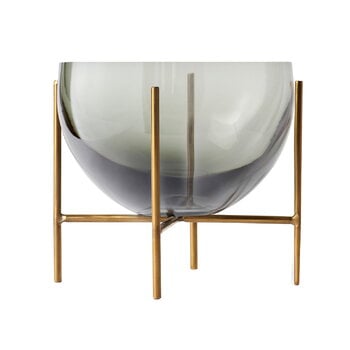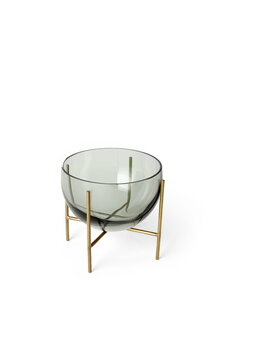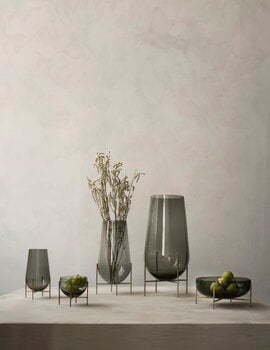The Échasse bowl from Audo Copenhagen is Theresa Rand’s contemporary take on traditional, elegant glass vases. Rand aims at creating objects that are both poetic and functional. Échasse's drop-shaped design was inspired by test tubes used in laboratories, and the French name meaning "stilts" refers to the slender brass base that elevates the glass vessel off the table top. Thanks to the flat bottom, Échasse vases and bowls can also be used without the brass base.
Échasse bowl, small, smoke
Audo Copenhagen
Description
The Échasse bowl from Audo Copenhagen is Theresa Rand’s contemporary take on traditional, elegant glass vases. Rand aims at creating objects that are both poetic and functional. Échasse's drop-shaped design was inspired by test tubes used in laboratories, and the French name meaning "stilts" refers to the slender brass base that elevates the glass vessel off the table top. Thanks to the flat bottom, Échasse vases and bowls can also be used without the brass base.
Product details (4)
- Material
- Brass, glass
- Colour
- Smok grey, brass
- Height
- 13 cm
- Diameter
- 15 cm
- Product ID
Designer
Theresa Rand is a Copenhagen-based designer who works mainly in furniture and interior design. Rand's approach to design focuses on natural, authentic and durable materials as well as a design language that combines clear lines and sensuality. She has collaborated with the German brand Blomus and Danish Menu, among others.
Rand was born in Germany but has lived in Denmark since 2011. Initially, she studied languages at the University of Cologne, but after graduating she decided to change fields and applied to study architecture at the Peter Behrens School of Architecture in Düsseldorf. She then moved to Copenhagen to continue her studies at the Royal Danish Academy of Arts, where she graduated in 2013. Already during her studies, she worked as a freelancer at design studios like Norm Architects and Space Copenhagen, among others. Later, she established her own design agency called Studio Theresa Rand.
View all productsReviews (1)
5
Based on 1 reviews
-
M
MARIA P
Padova, Italy
267 days ago
Sustainability
The Product Sustainability Framework, our criteria of sustainable design, helps you find the most sustainable products in our selection. Read below which sustainability criteria this product has met.
Working conditions & labour 7/9
-
Equal opportunities for all employees
-
Commitment to UN Global Compact, fair compensation for all employees
-
Corporate responsibility requirements defined and communicated for suppliers
-
Systematic work for improved inclusion and well-being in the workplace
-
Transparent supply chain
-
Suppliers' compliance to a code of conduct ensured
-
Compliance to the UN Guiding Principles on Business and Human Rights ensured in the supply chain
-
Direct suppliers audited and certified
-
Support for community involvement in the supply chain
Eco-friendly production 8/9
-
Fair and resource-wise water-use in production
-
No incineration or landfilling of returned items
-
No use of endangered species as materials
-
No direct environmental emissions or waste (excl. GHGs) from production
-
The sustainability of direct suppliers' production is addressed and monitored
-
Production and material sourcing that respect biodiversity, animal rights, and natural ecosystems
-
Material-efficient and ecological packaging
-
No potentially harmful chemicals used in own production
-
Positive impact on nature’s well-being through operations that regenerate natural ecosystems
Climate impact 4/8
-
Company's direct greenhouse gas emissions identified and commitment to reduction
-
Product's carbon impact identified and commitment to reduction
-
Guidance on energy- and eco-efficient use of the product
-
Carbon footprint of the product calculated and goals set to reduce it
-
Contribution to climate initiatives beyond the brand’s direct operations
-
Low-carbon or compensated transportation
-
100 % renewable energy in own production and operations
-
Carbon neutral or carbon negative product
Sustainable materials 6/6
-
Sustainable and long-lasting material choices
-
No harmful or hazardous substances
-
Responsible raw material sourcing and production
-
Materials suited for circularity: monomaterials, recyclable finishings, renewable or recycled contents etc.
-
Ecological materials: natural, biodegradable, recyclable or recycled contents
-
Outstanding materials in terms of innovativeness, responsibility, sustainability and circularity: local production or sourcing, 100 % recycled content, C2C-certification etc.
Circular design 4/5
-
High aesthetic quality promoting long-term use of the product
-
Technically durable product design and material choices
-
Design for enduring life-long quality
-
Design and support for product maintenance, repair and upgradability
-
Innovative circular design solutions: circular service system, resale platform, remanufacturing, collection of used products, etc.












